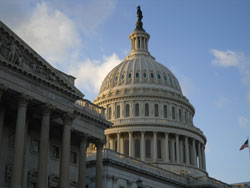WASHINGTON—The Trump administration’s creation of an office to safeguard health care professionals’ religious liberty has drawn praise from evangelicals and derision from advocates of so-called abortion and transgender rights.
Meanwhile, Arkansas physician Steve Goss, who serves on the Southern Baptist Convention Executive Committee, said new federal safeguards for religious freedom are not likely to change the practices of Christian health care providers or imperil the availability of medical services.
The administration announced Jan. 18 it will create a Conscience and Religious Freedom Division in the Department of Health and Human Services’ Office for Civil Rights. An HHS press release stated the new division will “more vigorously and effectively enforce existing laws protecting the rights of conscience and religious freedom, the first freedom protected in the Bill of Rights.”
The Conscience and Religious Freedom Division’s website specifically notes abortion and assisted suicide as procedures for which health care professionals may need conscience protection. Media reports speculated some doctors and nurses also may request protection against being forced to assist with gender transitions.

Southern Baptist ethicist Russell Moore called HHS’s action “a welcome and positive move.”
“Health care professionals do not put their consciences in a blind trust when they pursue medical training,” Moore, president of the Ethics & Religious Liberty Commission, said in a press release. “… I am thankful that HHS recognizes how imperiled conscience rights have been in recent years in this arena and is actively working and leading to turn the tide in the other direction. Health care professionals should be freed up to care for the bodies and minds of their patients, not tied up by having their own consciences bound.”
The Washington Post noted a 2009 incident, in which a nurse and Mount Sinai Hospital in New York was forced to assist in an abortion or face disciplinary action.
David Stevens, a physician and president of the Christian Medical & Dental Associations, said members of the organization he leads “have been discriminated against and some have even lost positions for speaking out” on matters of conscience.
“We are delighted that HHS has formed the Conscience and Religious Freedom Division,” Stevens said in a news release. “It is long overdue. There are already laws on the books. It will help address the injustices that laws were designed to prevent.”
Among pro-abortion and pro-transgender activists, the Human Rights Campaign’s Sarah Warbelow told The Post the Conscience and Religious Freedom Division seeks to “devalue the humanity of LGBTQ people.” Planned Parenthood vice president Dana Singiser said the division “will allow individuals and institutions to deny basic care for women and transgender people.”
Yet Goss, president of Mercy Clinic Northwest Arkansas Communities, a division of the Mercy health system with 200 health care providers, told Baptist Press patients need not worry that heightened conscience protection will limit access to medical care. The physicians Goss knows all provide care to anyone, even if they are engaged in a lifestyle the doctor regards as harmful or immoral, he said, using smoking and alcohol abuse as examples.
“For general, basic medical care,” Goss said, physicians “aren’t turning away smokers or those that abuse alcohol. They’re still going to take care of them. It’s just part of our oath, and I think they would do the same for most anyone else.”
Goss said he has never felt the need for heightened conscience protection in his own medical practice. But he appreciates HHS’s action because it “could be important for physicians” who decline for conscience reasons to perform procedures like abortion and gender transition, which they regard as “elective and perhaps even destructive.” (BP)
David Roach